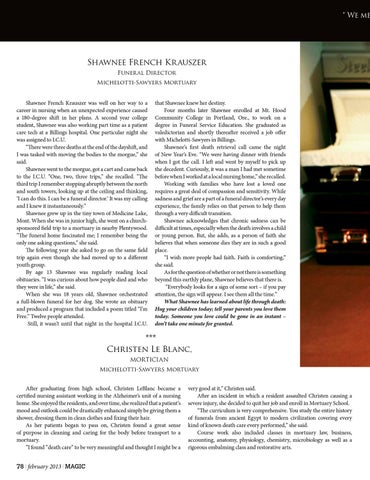“ We me
Shawnee French Krauszer Funeral Director Michelotti-Sawyers Mortuary Shawnee French Krauszer was well on her way to a career in nursing when an unexpected experience caused a 180-degree shift in her plans. A second year college student, Shawnee was also working part time as a patient care tech at a Billings hospital. One particular night she was assigned to I.C.U. “There were three deaths at the end of the dayshift, and I was tasked with moving the bodies to the morgue,” she said. Shawnee went to the morgue, got a cart and came back to the I.C.U. “One, two, three trips,” she recalled. “The third trip I remember stopping abruptly between the north and south towers, looking up at the ceiling and thinking, ‘I can do this. I can be a funeral director.’ It was my calling and I knew it instantaneously.” Shawnee grew up in the tiny town of Medicine Lake, Mont. When she was in junior high, she went on a churchsponsored field trip to a mortuary in nearby Plentywood. “The funeral home fascinated me; I remember being the only one asking questions,” she said. The following year she asked to go on the same field trip again even though she had moved up to a different youth group. By age 13 Shawnee was regularly reading local obituaries. “I was curious about how people died and who they were in life,” she said. When she was 18 years old, Shawnee orchestrated a full-blown funeral for her dog. She wrote an obituary and produced a program that included a poem titled “I’m Free.” Twelve people attended. Still, it wasn’t until that night in the hospital I.C.U.
that Shawnee knew her destiny. Four months later Shawnee enrolled at Mt. Hood Community College in Portland, Ore., to work on a degree in Funeral Service Education. She graduated as valedictorian and shortly thereafter received a job offer with Michelotti-Sawyers in Billings. Shawnee’s first death retrieval call came the night of New Year’s Eve. “We were having dinner with friends when I got the call. I left and went by myself to pick up the decedent. Curiously, it was a man I had met sometime before when I worked at a local nursing home,” she recalled. Working with families who have lost a loved one requires a great deal of compassion and sensitivity. While sadness and grief are a part of a funeral director’s every day experience, the family relies on that person to help them through a very difficult transition. Shawnee acknowledges that chronic sadness can be difficult at times, especially when the death involves a child or young person. But, she adds, as a person of faith she believes that when someone dies they are in such a good place. “I wish more people had faith. Faith is comforting,” she said. As for the question of whether or not there is something beyond this earthly plane, Shawnee believes that there is. “Everybody looks for a sign of some sort – if you pay attention, the sign will appear. I see them all the time.” What Shawnee has learned about life through death: Hug your children today; tell your parents you love them today. Someone you love could be gone in an instant – don’t take one minute for granted.
***
Christen Le Blanc, MORTICIAN Michelotti-Sawyers Mortuary After graduating from high school, Christen LeBlanc became a certified nursing assistant working in the Alzheimer’s unit of a nursing home. She enjoyed the residents, and over time, she realized that a patient’s mood and outlook could be drastically enhanced simply be giving them a shower, dressing them in clean clothes and fixing their hair. As her patients began to pass on, Christen found a great sense of purpose in cleaning and caring for the body before transport to a mortuary. “I found “death care” to be very meaningful and thought I might be a
78 I february 2013 I MAGIC
very good at it,” Christen said. After an incident in which a resident assaulted Christen causing a severe injury, she decided to quit her job and enroll in Mortuary School. “The curriculum is very comprehensive. You study the entire history of funerals from ancient Egypt to modern civilization covering every kind of known death care every performed,” she said. Course work also included classes in mortuary law, business, accounting, anatomy, physiology, chemistry, microbiology as well as a rigorous embalming class and restorative arts.
